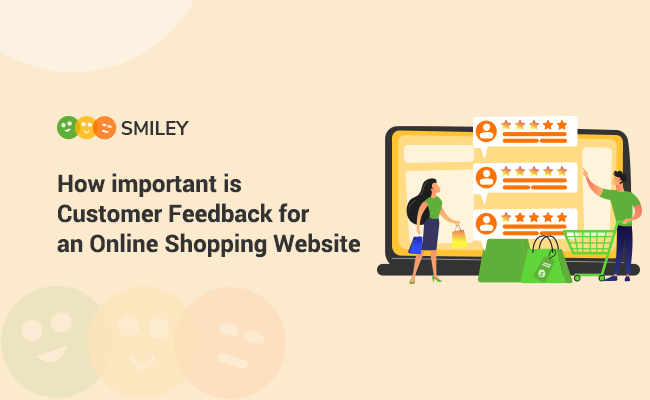Online shopping has become a mainstay for customers all around the world in today’s quickly changing digital scene. Customers rely greatly on their interactions and experiences with online shopping websites since it is convenient to browse and buy things from the comfort of their homes. Customer reviews stand out as a critical component that can make or break the reputation and performance of such websites among the many aspects that go into the success of an online shopping platform.
Absolutely! In the ever-evolving world of online shopping, customer reviews have emerged as a crucial element that can greatly impact the success and reputation of an e-commerce platform. Customers today heavily rely on the experiences and feedback shared by fellow shoppers to make informed purchasing decisions.
The Power of Customer Feedback
Enhancing User Experience through Personalized Suggestions
Online retailers can learn important information about the tastes and wants of their target market from customer feedback. These platforms can adjust their offers to meet client expectations by examining the remarks, ratings, and reviews given by users. Based on past purchases and customer feedback, personalized product recommendations improve user experience and make the shopping process more engaging.
Building Trust and Credibility
Positive customer feedback acts as a testament to the caliber and dependability of an online store. Reading about other people’s satisfying experiences encourages trust and trustworthiness among future clients. Negative feedback, on the other hand, identifies areas that want development and enables the website to respond to complaints, proving a dedication to client pleasure.
The Role of Feedback in Continuous Improvement
Identifying Strengths and Weaknesses
Customer feedback serves as a mirror reflecting the strengths and weaknesses of an online shopping platform. By analyzing patterns in feedback, website owners can identify areas where they excel and aspects that require immediate attention. This data-driven approach enables them to make informed decisions about resource allocation and improvements.
Iterative Enhancements
An online shopping website that values customer feedback can embark on a journey of continuous improvement. Regular feedback loops allow the platform to iterate on its offerings, user interface, and overall shopping experience. This iterative process not only keeps the website relevant but also helps it stay ahead in a competitive market.
Leveraging Feedback for Business Growth
Feedback is an invaluable resource for businesses seeking growth and improvement. Whether it comes from customers, employees, or stakeholders, feedback provides insights that can drive strategic decisions and enhance various aspects of your business. Here’s how you can effectively leverage feedback to foster business growth:
Listen Actively:
Create channels for feedback collection, such as surveys, suggestion boxes, or online reviews. Actively encourage your customers and employees to share their thoughts and opinions. Pay attention to both positive and negative feedback, as each holds valuable information.
Analyze Trends:
Regularly review the feedback you receive to identify recurring patterns and trends. This can help you pinpoint areas that require attention and improvement. Look for common pain points, suggestions for enhancement, and emerging needs.
Customer-Centric Approach:
Tailor your products, services, and strategies based on customer feedback. Addressing customer pain points and preferences can lead to improved customer satisfaction, loyalty, and ultimately, business growth.
Product and Service Enhancements:
Use feedback to refine your offerings. Launch updates or new features that directly address the concerns and suggestions provided by customers. This demonstrates your commitment to delivering value and meeting their evolving needs.
Employee Engagement:
Internal feedback from employees is equally important. Engaged employees have valuable insights into operational efficiency, workplace culture, and customer interactions. Act on their feedback to improve processes, boost morale, and increase productivity.
Innovation and Creativity:
Feedback can spark innovative ideas. Engage with your team to brainstorm solutions that leverage the insights gathered from customers and employees. This can lead to new products, services, or processes that differentiate your business from competitors.
Communication:
Keep customers and employees informed about the actions you’re taking based on their feedback. Demonstrating that you’re actively listening and making changes fosters trust and encourages continued engagement.
Continuous Improvement:
Treat feedback as a continuous cycle. Regularly gather and assess feedback, implement changes, and then gather more feedback to measure the impact of your efforts. This iterative process helps you stay aligned with evolving needs.
Data-Driven Decision-Making:
Feedback provides qualitative and quantitative data that can inform your strategic decisions. Use this data alongside other business metrics to guide your growth strategies effectively.
Reputation Management:
Address negative feedback promptly and professionally. Turn negative experiences into positive ones by resolving issues and showing genuine concern for customers’ concerns. This can help protect your brand’s reputation and prevent customer churn.
Feedback Training and Culture:
Create a feedback-friendly culture within your organization. Train employees to give and receive feedback constructively. When feedback is normalized, it becomes an integral part of your business’s growth strategy.
Benchmarking:
Compare your performance and customer satisfaction metrics with industry benchmarks. This allows you to see where you stand relative to competitors and identify areas where you can excel further.
Conclusion
Customer reviews are a priceless resource for online retailers in the digital age. It becomes more than just a simple recommendation and serves as a tool for development, enhancement, and client involvement. Online shopping platforms can develop a symbiotic connection with their customers that benefits both sides by proactively seeking out and incorporating client feedback.

